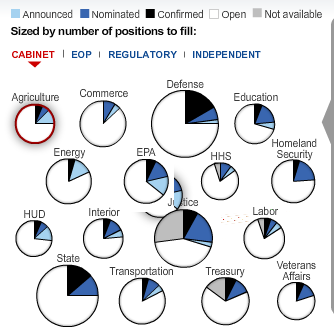US to world – sod off
The world may be in deep trouble, but Barack Obama is still stumbling around trying to staff up his government – testimony to a crazy appointment system and a domestic political environment more toxic than AIG’s balance sheet.
Much attention has been focused on Treasury’s failure to confirm enough staff to have anything sensible to say about the London Summit – but there are problems all round the world, with few Ambassadors in their jobs.
Take the farcical situation in Iraq, which, as I saw on a recent trip, desperately needs US civilian agencies to step up a gear as the military draws down.
You’d think that everyone would be desperate to get an ambassador in place to replace Ryan Crocker. But no – politics have intervened, with John McCain leading an especially boneheaded charge. It’s got so bad that top military brass are letting on that they’re thoroughly pissed off:
Sources tell The Cable that Centcom commander Gen. David Petraeus, top Iraq commander Gen. Raymond Odierno, and Defense Secretary Robert Gates are frustrated by the delay in getting a U.S. ambassador confirmed and into place in Iraq, and support [Christopher Hill’s] confirmation proceeding swiftly.
Opposition to the Hill appointment has been led by Sens. John McCain (R-AZ),Sam Brownback (R-KS), and Lindsey Graham (R-SC). Brownback has called Hill’s past dealings with Congress over North Korea “evasive and unprofessional.” In a joint statement last week, McCain and Graham wrote that Hill had a “controversial legacy” on North Korea, and added, “The next ambassador should have experience in the Middle East and in working closely with the U.S. military in counterinsurgency or counterterrorism operations. Mr. Hill has neither.”
Since the previous ambassador, Ryan Crocker, left the job Feb. 13, Odierno has complained of doing double duty: serving as the commanding general and the de facto ambassador.
The power vacuum in Baghdad comes at a critical juncture in Iraq’s transition, sources noted. The U.S. mission is becoming increasingly focused on political stabilization and economic development over military missions; Arab-Kurd tensions are rising in the north; struggles for dominance within and across sectarian groups are heating up in the aftermath of January’s provincial elections; the Baghdad government is facing tough budget choices due to declining oil prices; and national elections that will determine whether Iraq can consolidate its democracy are due by year’s end.
Keeping a lid on such political tensions is “crucial to consolidating the security gains from the surge,” a Washington Iraq hand said, “yet the advocates of the surge want to slow down the process of getting an ambassador to Iraq.” […]
If this drags on, Democrats may look to turn the tables on the Republican senators, who have argued that Iraq was so central to U.S. national security. “Why are they dicking around and not putting an ambassador in there if Iraq is so important?” the Senate Democratic foreign-policy staffer said.
It’s a point the generals are quietly saying among themselves, if not yet publicly.
I know that Washington really only cares about Washington, while the right is settling in for a decade long tantrum. But I wish they’d at least pretend they give a damn about everybody else…

